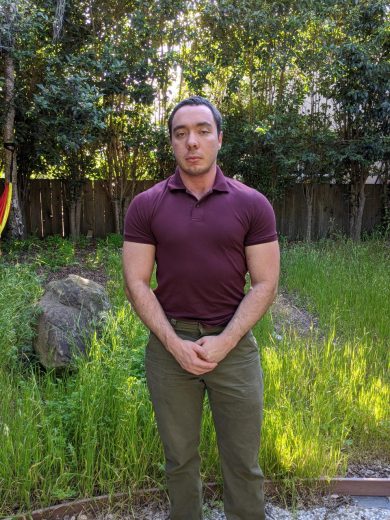Undergraduate Profile: Charles Wagoner, History Senior
By Zoe Quinton

Charles Wagoner is a senior undergraduate in the History department at UC Santa Cruz. His research project, The Far Eastern Republic in Memory, was awarded a 2020 THI Undergraduate Research Fellowship.
For THI, Zoe Quinton spoke with Charles this month about his research on memory, how he spends his spare time, and the pandemic.
Charles and other THI Undergraduate Fellows will be recognized at the Humanities Spring Awards on June 5, 4:00pm, on Zoom. RSVP to join us virtually for the celebration.
Can you tell me more about your research project, The Far Eastern Republic in Memory, that this award supports? When did you start it? What drew you to it?
My academic interests are generally focused around memory and the evolution thereof. How does the memory of an event/idea change over time? How do contemporaneous concerns affect that memory, and how can changes in how something is remembered be used to better understand prevailing attitudes within a given time period?
The highlights of my time at UC Santa Cruz have been the students who I have interacted with and the professors who have given me guidance.
To that end, the Far Eastern Republic was a relatively inconsequential state which briefly existed in the Russian Civil War. I started this project as part of an earlier seminar fall quarter this largely because I couldn’t find that much information about it, and that made me curious about the ways in which it was and was not being remembered in history. I also know someone who immigrated from the Russian Far East, which accounted for some of my initial interest in the subject.
I was able to find several Russian language sources which provided multiple different narratives about what the Republic actually was. I thought that how it was remembered and how that memory changed over time would be a very compelling and interesting paper to write.
You are a senior-year undergraduate—what have been the highlights of your time at UC Santa Cruz?
The highlights of my time at UC Santa Cruz have been the students who I have interacted with and the professors who have given me some guidance. I would like to give special thanks to Professors Breen, Brundage, and especially Professor Peterson. My academic goals remain uncertain; I intend to pursue post-bachelor’s education, but that has not changed over my time at UC Santa Cruz.
Can you tell us about your life outside of class? Any activities, hobbies, sports, or creative pursuits that help you to feel whole? How has the environment at UCSC affected you during your time here?
I deliver pizzas for work, and the two pseudo-sports which I dabble in are armwrestling and strongman. I also sporadically relearn how to play the saxophone, but I never do it for long enough to get any good. The environment at UCSC and Santa Cruz in general has given me a greater appreciation for the natural world.
Aside from historical memory, I really enjoyed writing a relatively brief paper on the use of beta blockers and other performance-enhancing drugs by classical musicians.
We are nearing the end of a unique school year in the history of UC Santa Cruz. How are you coping in this current moment, both in terms of your academic life and daily life? What do you do to try to stay focused and sane? Any tips for your fellow undergraduates or questions you are asking yourself now, about the future or otherwise?
Academically I am doing all right. I find that as long as I can put myself in a different physical location, I can focus. In terms of my personal life I try to keep things as “normal” as possible. Delivering pizzas is considered essential work so I still have a part time job, and I started purchasing gym equipment in January, so my routine has been less disrupted than it could be.
Charles Wagoner will be celebrated along with other THI Undergraduate Fellows at the Humanities Spring Awards on June 5, 4:00pm, on Zoom. RSVP to join us virtually for the celebration.
